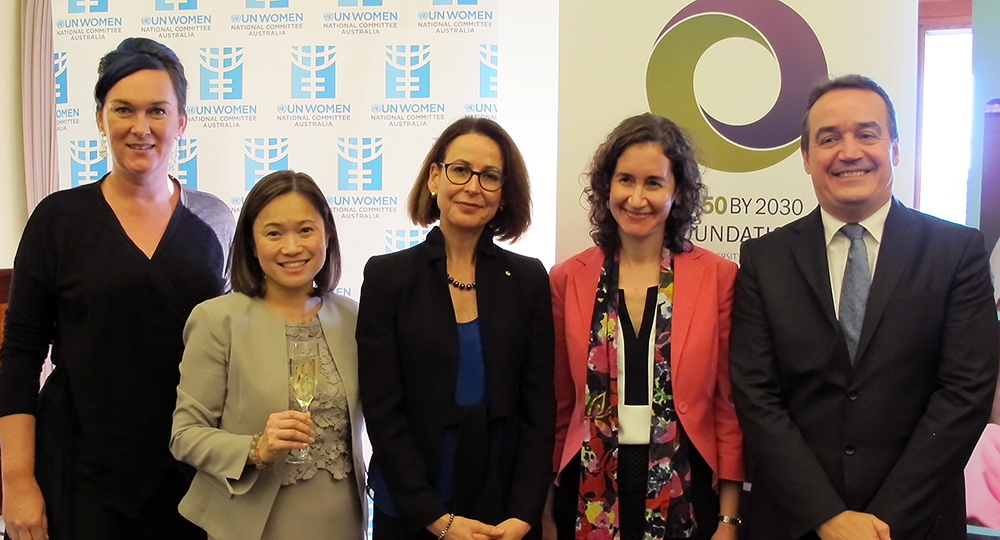The special panel discussion at Old Parliament House focussed on the United Nations’ Sustainable Development Goals (SDGs) and Gender Equality in global and Pacific contexts.
It was co-hosted by the 50/50 by 2030 Foundation and the UN Women National Committee Australia, and supported by the Australian Government’s Department of Foreign Affairs and Trade (DFAT).
Amy Haddad, DFAT’s Gender Specialist, opened the event. She told the audience that Foreign Minister Julie Bishop had held discussions with Yannick and Miwa prior to attending the panel event.
During the meeting, Ms Bishop reaffirmed that empowering women and girls to reach their full potential is a key pillar of Australia’s Foreign Policy and Aid Programme.
Empowering women and girls to reach their full potential is a key pillar of Australia’s Foreign Policy and Aid Programme.
50/50 by 2030 Foundation Director Virginia Haussegger acted as the facilitator for the discussion. She explained that in 2000 the UN established eight Millennium Development Goals (MDGs). Upon their expiry in 2015, 17 SDGs were agreed upon to provide a framework for sustainable development until 2030.
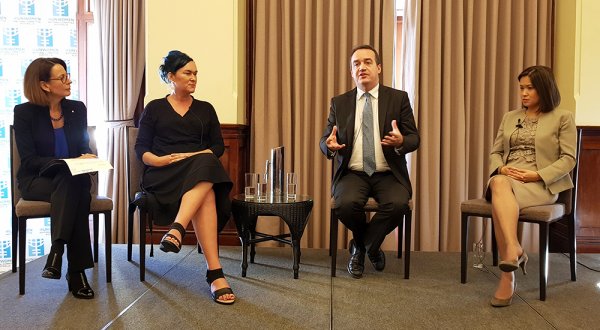
Yannick Glemarec outlines the progress made towards meeting SDG 5 during the panel discussion.
SDG 5 focuses specifically on ending gender-based discrimination, empowering all women and girls and eliminating all forms of violence towards them.
As three of UN Women’s leading experts in gender equality, and with a range of experience from the global to the regional levels, Virginia asked the panellists to expand upon the challenges and the opportunities around SDG 5. In particular, what’s working – and what’s not?
Yannick stated that we cannot implement the 17 SDGs in isolation, and that they are interconnected. “Gender equality is both a fundamental right, and a solution for all the other SDGs”, he argued. “To achieve these goals, we have no choice but to be ambitious”.
Gender equality is both a fundamental right, and a solution for all the other SDGs.
When asked what has been achieved since 2015, Yannick responded that there has been a revolution in awareness, from governments to corporations and social organisations, who know that there is a common agenda for peace, people, prosperity and the planet. He said “they know that there is no Plan B, because time is running out”.
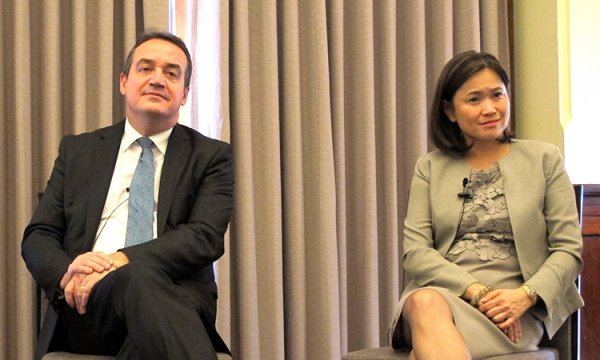
Yannick Glemarec (Deputy Executive Director for Policy and Programme, UN Women) and Miwa Kato (UN Women Asia and the Pacific).
To achieve these goals, we have no choice but to be ambitious.
Miwa pointed out that we must not lose sight of the issues behind the acronyms. She said that our collective response to SDG 5 reveals a great deal about how society thinks about gender equality: “The way we’ve been doing things is simply not enough to get us where we need to be. The key thing we want to introduce to the discussion is a sense of urgency”.
She also believes that across Asia there is more willingness to engage with SDG 5, not as a women’s rights issue but as a solution to other pressing challenges.
There is no Plan B, because time is running out.
Virginia asked Aleta whether she has seen a readiness to embrace the SDGs in the Pacific Islands. Aleta explained that on the upside, the power of the SDGs is that people understand them and can connect with them.
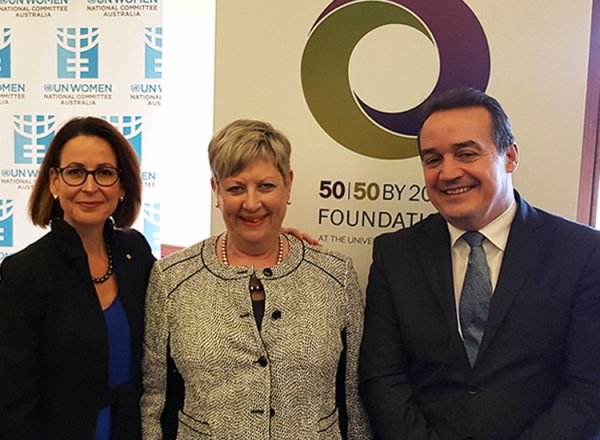
50/50 by 2030 Foundation Director Virginia Haussegger AM with Donelle Wheeler, former president of UN Women National Committee Australia, and UN Women’s Yannick Glemarec.
On the downside, she pointed out that although the Pacific has very strong women leaders, the region has some of the highest gender inequality in the world. As a result, there is an entrenched cultural disadvantage that must be overcome.
The way we’ve been doing things is simply not enough to get us where we need to be. The key thing we want to introduce to the discussion is a sense of urgency.
She highlighted that we will not meet the other SDGs if we don’t meet Goal 5, and that this is especially true in the Pacific.
Aleta acknowledged the Australian government’s support for UN Women’s work in the Pacific. She stressed that “they are much more than just a donor, they are strategic partners and thought leaders in working to meet the SDGs”.
We will not meet the other SDGs if we don’t meet Goal 5.
Miwa emphasised that the continued government support is crucial and unique, as it enables UN Women to gather data. “We cannot measure progress towards gender equality without credible data”, she argued.

After the event, Yannick Glemarec speaks with UN Women National Committee Australia team members.
When asked what can we as individuals do in Australia to help meet the goals, Yannick responded that “We can all signal in our day-to-day lives that we support the SDGs, as decision-makers, as consumers and as investors”.
Responding to a question from the audience about whether the implementation of quotas (such as mandated 30% female representation in parliaments) would drive change, Yannick replied that the effectiveness of such a solution would vary dramatically between countries.
We cannot measure progress towards gender equality without credible data.
Regardless of this, he stated that he strongly believes in quotas, because “if you don’t know what to aim for, you will not achieve progress”. Aleta’s response was a straightforward ‘Yes’.
A second audience question asked the panel to expand upon the connections between SDG 5 and the environment. Yannick replied that for him, “Gender equality is one of the most powerful and under-leveraged solutions we have for environmental sustainability. If you want to do it, engage women”.
Gender equality is one of the most powerful and under-leveraged solutions we have for environmental sustainability.
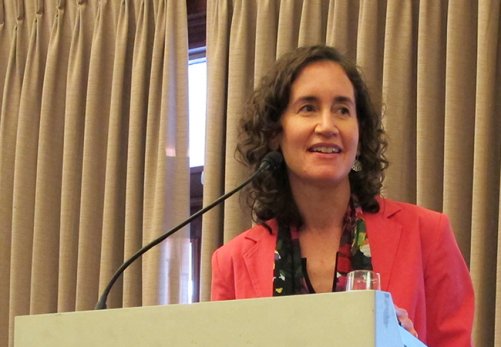
Janelle Weissman from UN Women National Committee Australia addresses the audience.
To close the evening Janelle Weissman, the Executive Director of the UN Women National Committee Australia, thanked the UN Women representatives for their insightful comments, and reminded the audience that “it’s up to all of us to ensure that we meet the SDGs”.
